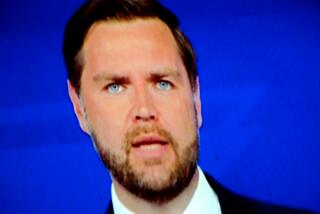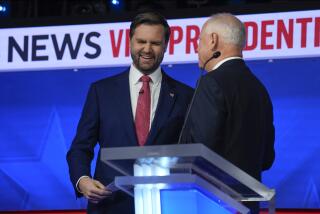Analysis : Bush Called Dominant in Debate : Dukakis Seen as Unable to Make Necessary Gains
- Share via
WASHINGTON — Near the end of Thursday night’s final presidential debate, Vice President George Bush said flatly that he would not take part in another such encounter and contended: “The American people are up to here with debates.”
Democrat Michael S. Dukakis, who earlier in the campaign had demanded as many debates as possible, did not argue the point. His lack of response may reflect a tacit acceptance of one salient conclusion that emerged from the encounter in Los Angeles: If Michael Dukakis is going to overtake George Bush in this campaign, he will have to find some other way to do it besides debating him.
As the underdog, Dukakis needed to whip Bush soundly in their encounter at UCLA, most analysts felt. Instead, he appeared at times to be having trouble just keeping pace with him.
“He needed to hit a home run, and all he hit was a single,” said Austin Ranney, chairman of the political science department at UC Berkeley and a longtime Democratic loyalist. Ranney thought Dukakis did better than Bush--”more knowledgeable and crisper,” he said--though not better enough to turn the tide of a campaign that is running against him.
Others were still harsher in their judgment of the Massachusetts governor.
“A very weak debate for Dukakis,” said University of Texas debate specialist Kathleen Jamieson, who like most other analysts thought Dukakis had outpointed the vice president in their first debate last month in Winston Salem, N. C.
But on Thursday night, Jamieson said “Bush was very high on specificity,” particularly in the earlier part of the debate. “Bush dominated the agenda for most of the evening,” she said.
Not until his closing statement did Dukakis get around to mentioning what has been the main thrust of his candidacy: the economic squeeze facing the middle class and his ability to alleviate it.
A Democratic pollster who asked not to be named said resignedly afterward: “He didn’t get his message across. He just got too bogged down in details.”
This campaign operative added that Bush “sort of unraveled” as the evening wore on. Indeed, the vice president’s answers, which had been relatively cogent and tightly drawn, became somewhat disjointed.
Responding to a question about nuclear energy, he said, in part: “And, therefore, I’ve made some proposals to strengthen the domestic oil industry by more incentives going in to look for and find and produce oil, make some incentives in terms of secondary and tertiary production. But we’re going to have to use more gas, more coal and more safe nuclear power for our energy base.”
Little Room for Error
But with a monthlong lead in the national polls and an even bigger advantage in the Electoral College, Bush could afford some uneven moments. Dukakis, as the underdog, had to be in top form nearly all the time.
If he were not, it may have been because the strategy devised by his advisers asked too much of him.
Unlike front-runner Bush, whose managers figured he only had to avoid making a serious mistake, Dukakis entered the encounter with a double-barreled mission: To force Bush into making an error and at the same time to present the human side of his own political personality.
Inevitably the two assignments conflicted, and, when the evening was over, it was questionable whether Dukakis had accomplished either.
“His trying to be nice seemed to cut into his competence,” Jamieson said.
Actually, Dukakis did not seem to try all that hard. At first, he seemed more relaxed and less didactic than in the first presidential debate last month. And, when Newsweek reporter Margaret Warner told him, “you won the first debate on intellect and yet you lost it on heart,” he responded good-naturedly enough.
“I think I’m a reasonably likable guy,” he said. “But I’m also a serious guy. I think the presidency of the United States is a very serious office. And I think we have to address these issues in a very serious way.”
While Dukakis was responding, Bush must have thought he was living a dream world. For more than seven years as vice president, with his own personality under constant scrutiny, he had to fend off charges of wimpishness.
Now, with the election less than four weeks away, partly as a result of his own surprisingly strong performance and partly as a result of Dukakis’ dour and bloodless demeanor, it was his rival’s psyche that had become the focus of journalistic scrutiny.
From his new position of normalcy and strength, Bush smoothly followed up on Dukakis’ response to the likability question by tuning his answer to catch the theme of his campaign.
“I don’t think it’s a question of whether people like you or not to make you an effective leader,” the vice president said. “I think it’s whether you share the broad dreams of the American people. I think it’s a question of values, not likability or lovability.”
Meanwhile, as the evening wore on, Dukakis’ early enthusiasm for being likable appeared to wear thin. He had jousted with Bush for an hour without seriously wounding him. And he had been pressed hard by the questions, including one bluntly accusing him of misstating his vote at a National Governors’ Assn. meeting on freezing Social Security cost-of-living increases and of “demagoguing” the issue.
So by the time he had heard Bush reject the idea of a third debate, Dukakis had passed up what Berkeley’s Ranney thought was a fine opportunity to bid for yet another confrontation with Bush and another chance to reverse the tide of the election.
Instead, he settled for a shot at a favorite target--Bush’s running mate, Indiana Sen. Dan Quayle.
Calls for Third Debate
Reminding everyone that Quayle had not fared so well in last week’s vice presidential debate against Dukakis’ running mate, Texas Sen. Lloyd Bentsen, Dukakis said: “Well, I can understand, after the vice presidential debate, why Mr. Bush would want no more debates.” The comment drew a mixture of cheers and boos.
At a rally of supporters afterward, Dukakis cried: “I think we ought to have that third debate, don’t you? We started to get our opponent out from behind the flag factories and the balloons, and people had a chance to see where we stand on the basic and fundamental challenges that face this country. That’s why debates are so important. That’s why we ought to have a third debate.”
More to Read
Get the L.A. Times Politics newsletter
Deeply reported insights into legislation, politics and policy from Sacramento, Washington and beyond. In your inbox twice per week.
You may occasionally receive promotional content from the Los Angeles Times.










